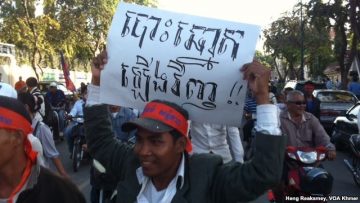 Astrid Norén-Nilsson
Astrid Norén-Nilsson
Lund University, Lund, Sweden
Keywords: neo-patrimonialism; patronage politics; clientelism; vote buying; rights; citizenship; Cambodia
DOI: 10.5509/2016894795
In the Cambodian national elections in 2013, the opposition Cambodia National Rescue Party (CNRP) experienced a strong surge in support, finishing a close second to the long-incumbent Cambodian People’s Party (CPP). Whilst the CNRP campaigned on an anti-money politics, rights-based agenda, the CPP has relied on gift-giving practices to maintain links with voters. This article explores changing popular conceptions of provision to assess to what extent a democratic, rights-based conscience in Cambodia has emerged under the current neo-patrimonial regime. Building on qualitative interviews with 192 voters in post-election Cambodia, it finds that gift-giving practices play a different role than current academic theorizations of popular politics, and Cambodian popular politics in particular, would lead us to expect. Ordinary Cambodians are found to make a distinction between contingent and non-contingent exchanges in electoral mobilization, rejecting the former and embracing the latter. CPP gift giving in its current guise is consequently devoid of popular legitimacy across the political camps. At the same time, the idea of meritorious gift giving lives on as an ideal, especially among CNRP supporters.
好礼物、坏礼物以及权利:柬埔寨公众对此的普遍看法以及2013年选举
关键词:新世袭主义;恩庇政治;恩庇侍从主义;收买选票;权利;公民身份;柬埔寨。
在2013年柬埔寨全国大选中,反对党——柬埔寨救国党的支持率一路飙升,最终位列第二,以非常接近的得票数屈居于长期执政的柬埔寨人民党之后。柬埔寨救国党的竞选是以权利为基础的反金钱政治为纲领,而柬埔寨人民党则是依靠赠送礼品的做法来维持与选民的联系。本文探讨了对何为恰如其分地提供物品的模式的普遍看法的变迁,以此来评估在柬埔寨现有的新世袭制政体下,民主的、以权利为依据的意识是否有某种程度的增强。根据对选举后的柬埔寨192位选民的定性化的访谈,本文发现赠送礼物的竞选做法起到的作用与当下大众政治的一般观点、特别是对柬埔寨大众政治的看法中预期的有所不同。本研究发现普通柬埔寨公众对选举动员中礼物换选票的做法有所区分,对根据选情酌情赠礼还是不依选情定夺的赠礼做法,他们拒斥前者而接受后者。结果是柬埔寨人民党目前这种形式隐蔽的赠礼竞选做法在所有政治阵营中都丧失了公众合法性。与此同时,善举式赠与礼物的观念则成为一种理想保留下来,在柬埔寨救国党的支持者中间尤其深入人心。
Translated from English by Li Guo